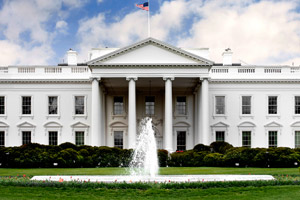AHA Attends White House Meeting on Faith-Based and Neighborhood Partnerships

I recently had the privilege of attending a meeting of the President’s Advisory Council on Faith-based and Neighborhood Partnerships at the White House, specifically in the Old Executive Office Building, the historic building where the State and War departments were located and where the office of the Vice President is based. The Council, which advises the President on the relationship between the federal government and religious and non-governmental organizations, held this specific meeting to discuss modern slavery and how it impacts our country and the world abroad.
The meeting itself was very informative and interesting; no doubt that the compassion and concern of the Council members towards determining a solution to modern slavery was evident throughout. But I couldn’t help but notice a few strange things, particularly the religious composition of the council, considering that it was supposed to represent all faiths, or at least the vast majority of those that the government acknowledges to exist in America. While there were two representatives from the Jewish faith and six representatives of the Christian faith, including a representative from the often-controversial Church of Latter-day Saints, there weren’t any representatives from the Muslim, Hindu or Sikh faiths, nor were there any humanists, atheists, or any other type of explicitly non-religious American on the Council. This represents a missed opportunity for the administration, because the advice they will get from this body isn’t representative of the religious tapestry that exists in America. I was forced to ask myself how the Council and the Administration can possibly take into account the experiences and desires of the Americans that aren’t present on this council, or if they even wanted to include those faiths and philosophies in the public policy process.
Furthermore, while the Council is tasked with advising the White House about the federal government’s relationship with the faith-based community and non-governmental organizations, almost all of the meeting focused on how faith groups could work with the government on this or that particular issue. Rarely did I hear a mention of what the “neighborhood” organizations could do. In fact, there were only four representatives from the non-governmental community on the fifteen-member Council, which made more sense to me as the meeting went on. That’s because the Council appears to be more of a faith-based advisory committee on the relationship between the federal government and the faith community rather than a true advisory council that is representative of the community of faith based, secular, and non-religious aid organizations that exist within America.
The issue of the Council’s composition doesn’t exist with the Council members themselves, but with the Administration and government in general. Right now, government officials and their staff are just starting to realize that there is a large non-religious community in America, but they haven’t taken the necessary step of including that community in policy discussions.
That’s why the American Humanist Association will continue to contact and meet with lawmakers, administration officials, and governmental figures of all types in 2013—especially to discuss the severe problem of the Obama Administration and the Office of Faith-Based Partnerships continuing to fund organizations that religiously discriminate in hiring practices. We can’t just hope that the government will reach out to us like it does with other communities in America. Instead, we have to be proactive in our relationship with the government and let them know how we feel about the issues that affect us all equally as Americans.
Humanists and non-religious Americans only want to help make this country better, but we are tired of being overlooked or purposely excluded by government officials who are tasked with trying to fix our nation’s problems. Thankfully, the Obama administration and many offices in Congress have been much more receptive to our community than politicians in previous decades, and many government institutions appear more willing to listen to our opinions if we remain unrelenting in airing them. Hopefully, this trend continues and we aren’t prevented by our own government from helping our nation and the international community.
